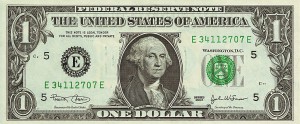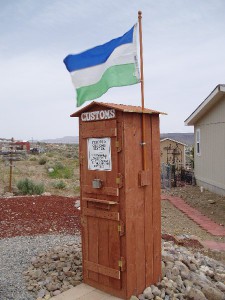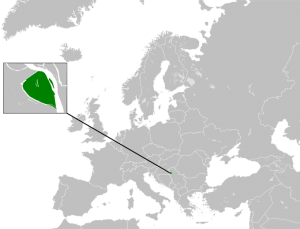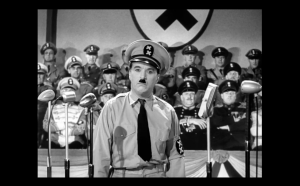Maybe you’re weary of the direction the United States is headed. Maybe you feel that the values of the federal government are not in line with your own. Maybe you’d like to own a specific type of bird, but a couple of “law enforcement officers” keep telling you that it’s “illegal” to own that certain type of bird.*
* Disclaimer: The Mycenaean does not condone the illicit purchase, sale, or ownership of avian creatures.
Lucky for you, there’s a way to solve all of your concerns: starting your own country.

Now, you may be thinking to yourself “Start my own country? But I’m just an ordinary citizen, not some kind of George Washington or William Wallace.” Of course you are, but that is irrelevant. Many leaders of the world, past and present, have come from humble origins. When Jimmy Carter was a young man, he worked as a peanut farmer in rural Georgia, and Russian President Vladimir Putin is the son of a Navy conscript and a low-ranking factory worker. Despite being pretty unremarkable in their youth, both became the leaders of some of the most powerful nations on Earth.
So now you’re probably thinking “Ok, you’ve hooked me. So how do I start my country.”
All you have to do, simply put, is declare your independence. The United States did it, and look where it is now: back-to-back world war champ and (arguably) the only remaining global superpower.
Declaring your independence is, of course, very easy. Just say “this land is now independent,” and there you go, independence declared. However, retaining your independence is a bit trickier, especially when you try to retain a large tract of land. The fact that there is no Confederate States of America is a testament to this. However, so long as you keep your territory small, your sovereignty may go fairly unchallenged.
When I was little, a few friends and I started our own country, which we named the Republic of Methlehem, stating that our domain was a cluster of backyards and houses along with a small patch of woods. We wrote a declaration of independence and a constitution, formed our very own government and even made a flag. Despite our name implying that we had created our nation to provide a paradise for meth-addicts, we made sure to obey all laws of the United States of America (except, of course, the law stating that you can’t secede from the United States of America). Sadly, our small homeland was lost to the ages, and is now defunct.
Another and more present example of someone declaring their independence from the United States would be the Republic of Molossia.

Molossia is a self-proclaimed independent state located on 11.3 acres of land in Nevada, with two enclaves located in California. The nation, while not officially recognized by any world power, has continued to exist, unchallenged (from a legal standpoint) since 1977. On one hand, the minute republic isn’t home to an endangered species meat emporium, a heroin processing plant or any other illicit operation (as far as we know), so neither the Nevadan nor US government have any real reason to act. It also doesn’t hurt that Kevin Baugh, the nation’s leader, is a retired United States Army sergeant and currently works in human resources at the Nevada National Guard. On the other hand, the United States should feel threatened, considering the strength of the Molossian Navy and the scientific advancements of the Molossian Air and Space Exploration Ministry.
However, there are self-proclaimed states that have faced legal hurdles to independence.

The Free Republic of Liberland has had its share of problems since its founding on a 2 mi2 piece of disputed territory between Serbia and Croatia. Liberland was founded by Czech politician Vít Jedlička in 2015 as an attempt to create a libertarian state in Europe. Since its foundation Liberland has been engaged in a legal battle on whether or not it could be considered a free state. The Liberlanders say “yes” due to the fact that neither Serbia nor Croatia have legal claim to the land, but the Croatians say “no” because that would make them look weak. The fledgling nation has, however, received support from a member of the Croatian parliament, and has established “representative offices” in 60 other countries, including the United States. As any good and strong nation should, they even have their own wine and beer.
![Many people in Spain’s Basque Country support independence for the region. Shown here is a shop adorned with a sign reminding tourists that they “neither [in] Spain nor France. This is the Basque Country.” (Photo courtesy of Wikipedia user Jorgechp)](https://www.themycenaean.org/wp-content/uploads/2017/04/Beauregard_Basque-300x225.jpg)
At least the Basque people have a quinquennial Basque-centered festival in Idaho to look forward to.
In the Balkans, the breakaway republic of Kosovo has also faced challenges since declaring its independence in 2008. Although 111 member-states of the United Nations recognize Kosovo as a free nation, Serbia, the nation Kosovo broke away from, still holds the belief that Kosovo is Serbian territory. Thankfully, violence between the two states has been low since the declaration, aside from the occasional violent protest.
In conclusion, you can start your country, and as long as you keep it small and inoffensive, you’ll probably do well for yourself. However, if you don’t have an immense amount of firepower or a dedicated following, don’t expect the FBI to not come knocking down your door wondering why there are dozens of endangered birds from the Congo flying around.

Leave a Reply